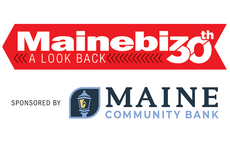
Processing Your Payment
Please do not leave this page until complete. This can take a few moments.
- News
-
Editions
-
- Lists
-
Viewpoints
-
Our Events
-
Event Info
- Women's Leadership Forum 2025
- On the Road with Mainebiz in Bethel
- Health Care Forum 2025
- On The Road with Mainebiz in Greenville
- On The Road with Mainebiz in Waterville
- Small Business Forum 2025
- Outstanding Women in Business Reception 2025
- On The Road with Mainebiz in Bath
- 60 Ideas in 60 Minutes Portland 2025
- 40 Under 40 Awards Reception 2025
- On The Road with Mainebiz in Lewiston / Auburn
- 60 Ideas in 60 Minutes Bangor 2025
Award Honorees
- 2025 Business Leaders of the Year
- 2024 Women to Watch Honorees
- 2024 Business Leaders of the Year
- 2023 NextUp: 40 Under 40 Honorees
- 2023 Women to Watch Honorees
- 2023 Business Leaders of the Year
- 2022 NextUp: 40 Under 40 Honorees
- 2022 Women to Watch Honorees
- 2022 Business Leaders of the Year
-
-
Calendar
-
Biz Marketplace
- News
- Editions
- Lists
- Viewpoints
-
Our Events
Event Info
- View all Events
- Women's Leadership Forum 2025
- On the Road with Mainebiz in Bethel
- Health Care Forum 2025
- On The Road with Mainebiz in Greenville
- On The Road with Mainebiz in Waterville
- + More
Award Honorees
- 2025 Business Leaders of the Year
- 2024 Women to Watch Honorees
- 2024 Business Leaders of the Year
- 2023 NextUp: 40 Under 40 Honorees
- 2023 Women to Watch Honorees
- 2023 Business Leaders of the Year
- + More
- 2022 NextUp: 40 Under 40 Honorees
- 2022 Women to Watch Honorees
- 2022 Business Leaders of the Year
- Nomination Forms
- Calendar
- Biz Marketplace
A Look Back: Looking back at the outlook issues

For at least the past two editors at Mainebiz — a decade under my watch and five years under Carol Coultas — the first issue of the year has been devoted to an economic outlook.
Under Carol’s watch, the “economic” aspect was quite literal, with a lineup of economists making predictions. In recent years, we’ve opened it up to leaders of all kinds — from small businesses, publicly traded companies, nonprofits, professional services firms and health care institutions.
There were highlights and lowlights, on-target predictions and wildly off-target misses. Here are some samples:
In 2015, when Maine was still feeling the effects of the 2008–09 recession, Charlie Colgan, former professor of public policy and management at the University of Southern Maine, foreshadowed later challenges with labor shortages: “Maine has about 10,000 jobs to recover before we get back to pre-recession levels, and we should make it most of the way back by the end of 2015 or 2016. But Maine is also at the leading edge of labor shortages that will characterize the economy for the next several decades, and our ability to add jobs is becoming constrained.”
A year later, in 2016, Jonathan Reisman, an associate professor at University of Maine Machias, took an even more pessimistic view of Maine’s ability to tackle labor shortages: “Not with our current business and political climate. The answer, short of a time machine to go back and raise fertility rates, is immigration, but you need a ‘pull’ factor to compete with other states or countries, and improve our attitudes toward capitalism and immigrants.”

In 2019, the last full year before the pandemic, forecaster Jim Damicis of Camoin Associates said he was encouraged by the growth of multifamily housing. “Changing market dynamics call for multifamily and workforce housing, and housing to meet the needs of an aging population.” All that was true, but we had no idea what was ahead with the housing demand as the pandemic saw a wave of urban refugees seeking Maine’s more rural living.
In January 2020, just two months before COVID-19 lockdowns, the business forecast was eerily rosy. One financial advisor cited a “continued positive outlook,” while a banker was buoyed by the economy’s “very robust pace.”
Yet in early 2020 there were also concerns about worker shortages, rising construction and health care costs, not to mention the upcoming elections, which were expected to be “hotly contested.” All of this foreshadowed a historically challenging year.












0 Comments